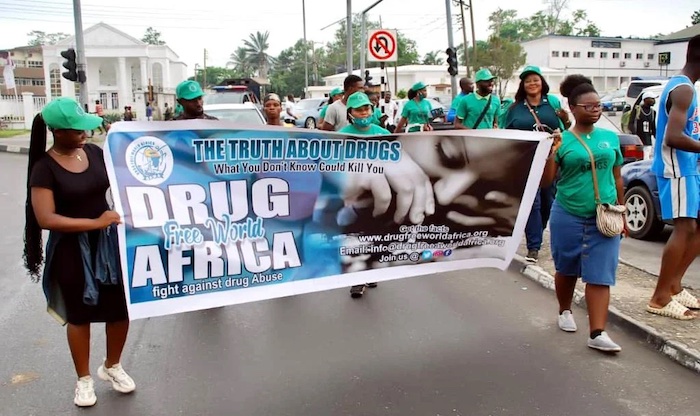Not less than 233,000 young people are involved in drug abuse in Rivers State, according to Rivers State commissioner for health, Chidinma Oreh.
Citing a 2019 drug abuse report published by the United Nations, she said out of 10 drug abusers in the State and the South-South at large, 4 were women, with 16.6% of youths in the region involved in the ills.
The Rivers health commissioner spoke at the Regional Level Multi-Stakeholders’ Dialogue on Drug Abuse Prevention in the Niger Delta, held in Port Harcourt, on Saturday. She was represented by Quanta Roland.
“According to the United Nations statistics from 2019, the prevalence of various substances used in the South- South geo-political zone between people aged 15 to 64 is increasingly becoming worrisome, with over 16.6% engaged in drug and substance use and alcohol, marijuana and heroine particularly ranking highest, 35.1% for alcohol, 15.7% for marijuana and 15.3% for heroine.
“According to this statistics from the office of the United Nations on Drug and Crime, the prevalence in Akwa Ibom State was reported to be 12.5% with approximately 352,000 individuals affected. In Bayelsa State, that research reported that the prevalence of drug and substance abuse was 11.2%, affecting approximately 220,000 individuals. In Delta State, the prevalence was 18%, affecting a population of 513,000 persons. In Edo State, we had a prevalence of 15% impacting 330,000 individuals while in Rivers State, the prevalence was 11.8% affecting 233,000 persons,” she disclosed.
Warning that the rate of drug abuse prevalence had remained on the increase to date, Dr Oreh called for concerted effort by state governments and stakeholders in the region to combat the menace.
Chairman of Nigeria Medical Association (NMA), Diamond Tamunokuro, in his view, said the only way to curb drug abuse was to stop the demand for drugs.
“As long as demand keeps increasing, supply is going to increase. We’re talking about an addiction. It means the person that is addicted to drug will do everything he can and spend everything he has to make sure he gets the drugs. We need to start thinking about the end users and start thinking about how to rehabilitate them.
The other aspect is manpower. The issue of gross lack of people that are in this business of rehabilitation is affecting what we need to achieve in curbing drug abuse. The fact that we have just about 300 psychiatrists or less in the entire country of over 200 million people means that there’s a lot we need to do to develop and train more psychiatrists.
The government needs to start looking at subsidizing the training for psychiatrists and more psychiatric nurses also so that we can have more people available to rehabilitate people who are already (drug) addicts,” Dr Tamunokuro said.
Commander of narcotics and deputy zonal commander, operations and training, National Drug Law Enforcement Agency (NDLEA), Port Harcourt, Emmanuel Ogbumgbada said the number of drug abusers was on the increase despite the effort being made by his agency to curb the menace.
He called on other stakeholders to do their own part in helping to reduce the demand for drugs, adding that NDLEA could not do it alone.
Policy and advocacy specialist of Search for Common Grounds, organisers of the event, Caleb Tidi said the dialogue was meant to serve as a platform for stakeholders in the Niger Delta to tinker on how to tackle the issue of drug abuse.
“Coming out of some of our engagements and initiatives, we’ve identified drug abuse as a key issue that needs to be tackled. This project is about preventing criminality and violence in the Niger Delta. Most crimes have elements of drug abuse in them. So if you want to prevent criminality and violence, we have to put in deliberate effort to curb drug abuse. That is why we’re bringing various stakeholders here, from government representatives, health (officials), CSOs as well as security agencies, so that we can discuss together and find solutions that promote a safer Niger Delta where drug abuse is not rampant,” he said.
Blessing Ibunge in Port Harcourt

